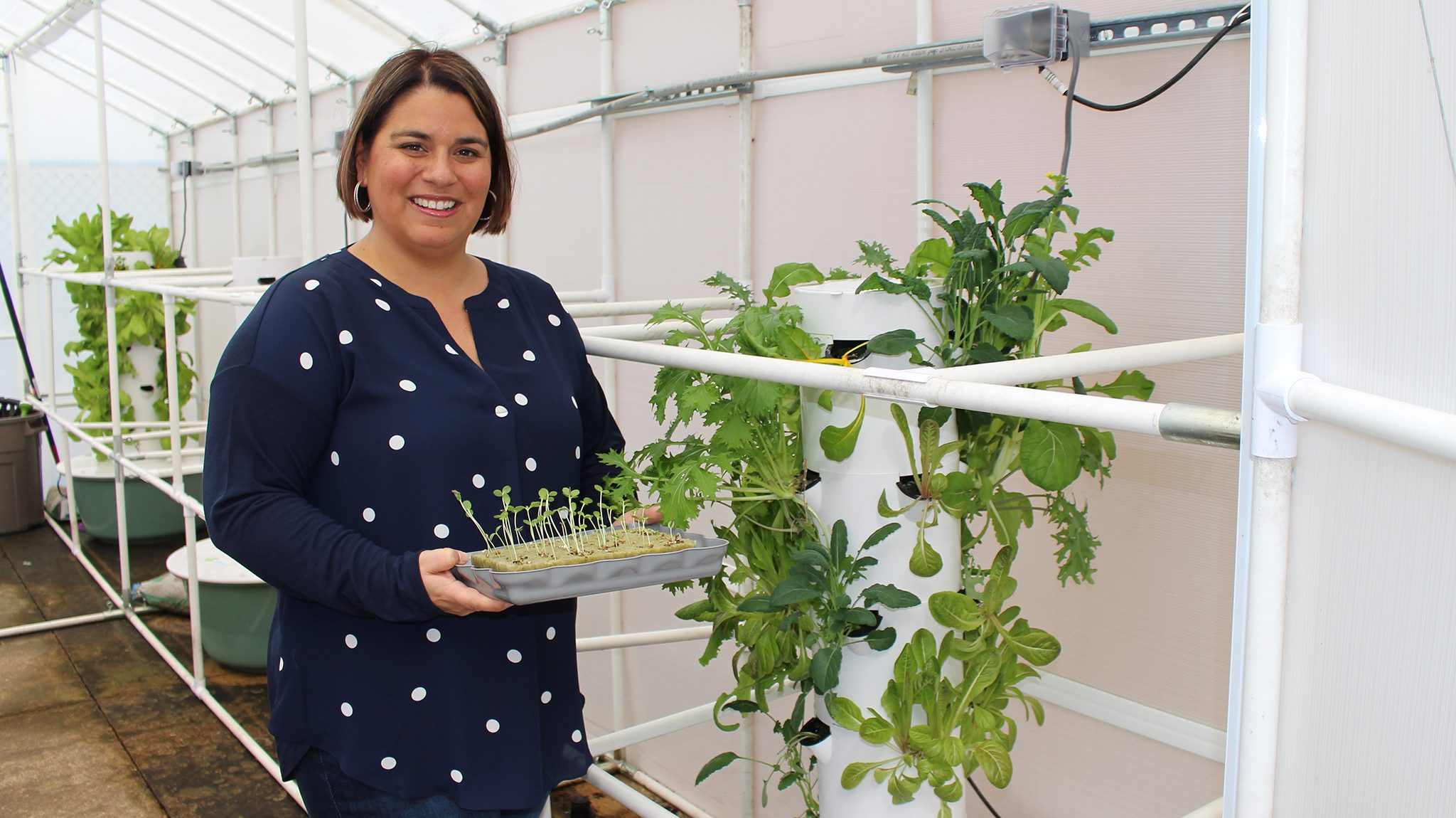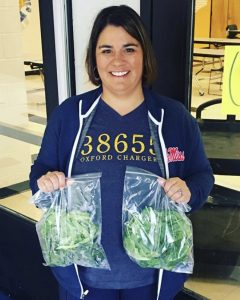
Tess Johnson, a UM master’s student in health promotion, tends the tower garden in the greenhouse at Willie Price Lab School. Photo by Sarah Sapp/UM School of Applied Sciences
OXFORD, Miss. – Students at Oxford’s Bramlett Elementary School and the University of Mississippi‘s Willie Price Lab School have been learning to grow fresh greens and herbs in tower gardens, harvesting them for salads and smoothies while learning valuable lessons about nutrition and growing food.
The produce that once served as a learning tool and healthy snack for area children is being put to use in a new way during the COVID-19 health crisis – feeding families in need.
Tess Johnson, an Ole Miss master’s student in health promotion, is leading the tower garden project and worked with teachers and administrators at both schools to coordinate keeping the towers going after schools closed due to the pandemic. Thanks to their combined efforts, any family utilizing the grab-and-go program at Oxford Middle School or the Oxford Pantry to supplement their nutritional needs can get leafy greens and fresh herbs when one of the 12 tower gardens is ready to harvest.
“We did not want to end our projects and knew that the community could benefit from free produce, so we all agreed to keep growing,” Johnson said. “I plan to grow at both Willie Price and Bramlett for as long as they will let me. I would feel selfish if I stopped when we have access to such a wonderful tool that can grow food for our community and didn’t utilize it.
“Teachers are willing to help check on and harvest the towers; it is a group effort and by no means only me. We are also able to share the pictures of the towers growing with students at both schools, so they can feel connected to what is happening.”
The project also includes tower gardens at Guyton Hall and the Turner Center, home of the Department of Health, Exercise Science and Recreation Management, that will be donated when they are ready.
Allison Ford-Wade, professor of health promotion and behavior and associate dean of community engagement in the School of Applied Sciences, oversees the graduate program in health promotion. She works closely with Johnson on her research project to evaluate whether students exposed to tower gardening will consume more vegetables and if students will significantly increase their preferences for vegetables after exposure to classroom gardens.
The passion for creating healthier communities that she sees in Johnson is a passion that undergraduate students can pursue in the newest degree program offered by the School of Applied Sciences: the Bachelor of Science in Public Health and Health Sciences, or PHHS, Ford-Wade said.
“Tess has a real passion for helping children, but students in our new PHHS program can choose a path that aligns with their own professional and personal passions – to serve any population that is meaningful to them as program planners and evaluators, school educators or other roles in the public health sector,” Ford-Wade said.

UM graduate student Tess Johnson drops off fresh greens harvested from the tower garden at Willie Price Lab School to Oxford Middle School, where they will be distributed to local families using the grab-and-go lunch program. Submitted photo
“The spotlight is on public health workers everywhere during the COVID-19 crisis. Now, more than ever, we need professionals who can understand the science and translate it in a meaningful way for the public. The breadth of this degree suits future professionals at every level – from those leading local programming, like the tower gardens, to those coordinating public health information for the Centers for Disease Control.”
The PHHS degree is housed in the Department of Health, Exercise Science and Recreation Management. The curriculum is focused on health promotion and behavior and public health science.
Graduates will be eligible to sit for the National Commission for Health Education Credentialing Inc.’s Certified Health Education Specialist Examination and will be prepared for careers in public health, health education, community health, worksite health, population and global health, and other health-related professions.
Students enrolled in the health science studies emphasis area will focus on preparing for graduate education in medicine, nursing, physical therapy, occupational therapy, athletic training and other health-related professions. Students enrolled in the community health emphasis area will develop foundational and applied knowledge in the area of health promotion, community health and public health.
Students will learn how to plan, implement and evaluate local programming, such as the tower garden project Johnson is running, but those enrolled in the community health emphasis also will learn to apply their knowledge to scale at state, national and global levels.
Those enrolling in the major will complete courses such as Basic Epidemiology, Human Health and Illness, Environmental Health, Public Health Policy, Personal and Community Health.
Students in the community health emphasis also will complete a professional experience in a community health setting or agency. They will work under faculty supervision with a professional in health education or health promotion who will serve as a mentor.
“If you are an inspired leader or compassionate provider looking for a way to make a difference in the world, this program is an incredible place to start,” Ford-Wade said.
That’s what attracted Johnson to the Ole Miss program. Aside from the garden project, she is also passionate about helping local children maintain physical activity and mindfulness practice.
Johnson began teaching kids yoga at Willie Price Lab School part time in 2016. With no way to join the children for group practice during the health crisis, Johnson records a yoga class each week to share with their families.
“The driving focus for me is simple: to help my community and be a resource for them,” she said. “Teaching kids about growing their own food or how to use the power of their breath is so rewarding. I want all kids to have the tools they need to be healthy. I want schools, communities and people in general to have tools that can help them better their lives.
“That is why the health promotion program was such a perfect fit for me when I had the opportunity to go back to school for my master’s.”
For more information about the PHHS program, contact Ford-Wade at ford@olemiss.edu.